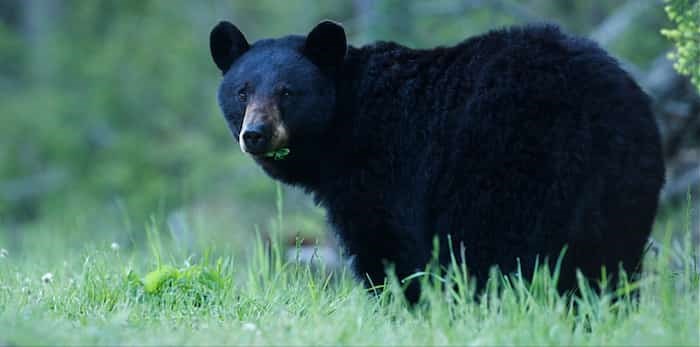 Photo: black bear in grass / Shutterstock
Photo: black bear in grass / Shutterstock
British Columbia is considered "bear country" for a good reason: the province teems with bruins in a variety of shapes and sizes.
With this in mind, not every British Columbian has encountered a bear. In fact, many locals haven't even observed one from a distance. However, if they have seen one, there's a good chance that it was a black bear (even if it wasn't black).
That's right - the black bear, the most common of the three bears found in Canada, comes in a variety of colours and shades. Wild Safe B.C. notes that these bears come in, "everything from the white Kermode bear through to their namesake black and most shades of brown in between."
And while the black bears on Vancouver Island are considerably larger than their mainland cousins, they aren't the largest in the province. That title goes to their neighbours to the north on Haida Gwaii.
Not only are the black bears on Haida Gwaii larger than anywhere else in the province, but they are also bigger than any other black bears in the world.
Often seen foraging in the intertidal zone, these omnivorous animals play a vital role on the Islands. While they enjoy a variety of seafood, such as crabs, sea-urchins, and salmon, they also snack on green vegetation like cabbage, ferns, and nestles. In addition, the bears snack on berries in the spring and summer months. As apex predators, these bruins have few predators, except grizzlies, wolves, and each other.
Parks Canada notes that the Haida have long respected this animal, calling bears Taan, or “Brother of Man”. It notes that, "At Gwaii Haanas, it is our policy that if a bear becomes habituated to people, the area will be closed to people—we will remove the people, not the bears." As such, Parks Canada asks visitors to act responsibly in the wilderness.
According to iNaturalist, the black bears of Haida Gwaii are also considered a "keystone" species because of the, "bears' transportation of salmon remains into the surrounding forests of the Haida Gwaii."
For more information about black bears, and how to stay safe around them or to avoid an encounter, visit Wild Safe B.C. online.


